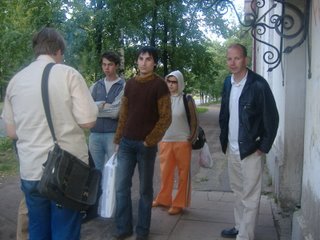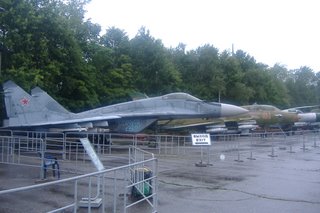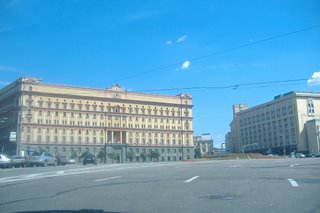Fair and Balanced
'The Mail in Ireland will have to have a different slant as compared to the Mail in Britain'. Here my friend and I agreed and from there we discussed what kind of audience he might be writing for in his capacity working for the Daily Mail in Ireland.
For the past ten years and probably before, the Daily Mail has been serving up a diet of fear and loathing for the great British middle classes. Will Self wondered what effect Sars would have on property prices, because that is what Daily Mail readers want to know.
The arrival of the Daily Mail in Ireland has been prepared over a period of a few years. While other papers such as the Dublin Daily News came in and went in and out of business, Associated Press through its Irish arm- Ireland on Sunday- recruited either soon to be unemployed journalists or underpaid journalists.
It is one of the only media outlets that offers journalists a genuine career path hence the good stories from good professionals. While Michael O' Farrell of the Irish Examiner gave much coverage to the GAMA strike, he is one of several journalists to defect to AP succumbing to the allure of a decent career.
The Evening Herald sent a rookie reporter to cover the 2003 wedding in the Mansion House of the two homeless punks Joe and Joanne Neeson. The breaking story made the front pages and tv screens of the national broadcasters. This was followed up by an interview on Eamon Dunphy's Friday night chat show.
The Ireland on Sunday sent a squad of hacks to follow Joe and Joanne around for weeks in Ireland and her family in Manchester until they discovered the Jo did not invite her parents to the wedding. They delivered a splash on this scoop. The story sums up the mean nature of the leading lights in the AP empire. While some papers and yes the lazy journalists gave emphasis to the quirky nature of the wedding, the Mail's hack set out to destroy the good will the original story of two rough sleepers marriage in the Mansion House brought.
It is a case example of the motivations and mindset inside a paper whose history is littered with unsavioury connections including the Mosley fascists in the 1930s, while its screaming headlines aim to ram the Irish government into closing its borders to immigrants and to force existing migrant to speak English and abandon their own cultures if they wish to live here.
Yet the Daily Mail in the 1930s was the only British paper to openly support the German Nazi's while Lord Rothermere considered Hitler and Mussolini to be his friends. It considers itself to be anti- European, anti- immigrant, anti- abortion and pro- family (whatever that means), pro- church, pro- tax cuts.
The Mails front page expose of Stephen Lawrence murderers 'Murderers- if we are wrong let them sue' was shortlisted to one of the five most influential headlines of the 20th century, indicating its role as crucial opinion former.
This lays the basis for the next article in response to the coterie of right wingers employed as opinion formers in right wing newspapers that dominate the media landscape but profess to be a minority in a left wing dominated profession
For the past ten years and probably before, the Daily Mail has been serving up a diet of fear and loathing for the great British middle classes. Will Self wondered what effect Sars would have on property prices, because that is what Daily Mail readers want to know.
The arrival of the Daily Mail in Ireland has been prepared over a period of a few years. While other papers such as the Dublin Daily News came in and went in and out of business, Associated Press through its Irish arm- Ireland on Sunday- recruited either soon to be unemployed journalists or underpaid journalists.
It is one of the only media outlets that offers journalists a genuine career path hence the good stories from good professionals. While Michael O' Farrell of the Irish Examiner gave much coverage to the GAMA strike, he is one of several journalists to defect to AP succumbing to the allure of a decent career.
The Evening Herald sent a rookie reporter to cover the 2003 wedding in the Mansion House of the two homeless punks Joe and Joanne Neeson. The breaking story made the front pages and tv screens of the national broadcasters. This was followed up by an interview on Eamon Dunphy's Friday night chat show.
The Ireland on Sunday sent a squad of hacks to follow Joe and Joanne around for weeks in Ireland and her family in Manchester until they discovered the Jo did not invite her parents to the wedding. They delivered a splash on this scoop. The story sums up the mean nature of the leading lights in the AP empire. While some papers and yes the lazy journalists gave emphasis to the quirky nature of the wedding, the Mail's hack set out to destroy the good will the original story of two rough sleepers marriage in the Mansion House brought.
It is a case example of the motivations and mindset inside a paper whose history is littered with unsavioury connections including the Mosley fascists in the 1930s, while its screaming headlines aim to ram the Irish government into closing its borders to immigrants and to force existing migrant to speak English and abandon their own cultures if they wish to live here.
Yet the Daily Mail in the 1930s was the only British paper to openly support the German Nazi's while Lord Rothermere considered Hitler and Mussolini to be his friends. It considers itself to be anti- European, anti- immigrant, anti- abortion and pro- family (whatever that means), pro- church, pro- tax cuts.
The Mails front page expose of Stephen Lawrence murderers 'Murderers- if we are wrong let them sue' was shortlisted to one of the five most influential headlines of the 20th century, indicating its role as crucial opinion former.
This lays the basis for the next article in response to the coterie of right wingers employed as opinion formers in right wing newspapers that dominate the media landscape but profess to be a minority in a left wing dominated profession



















